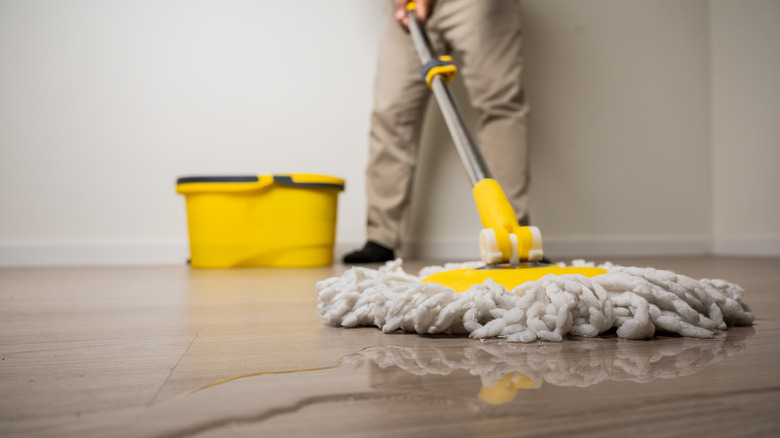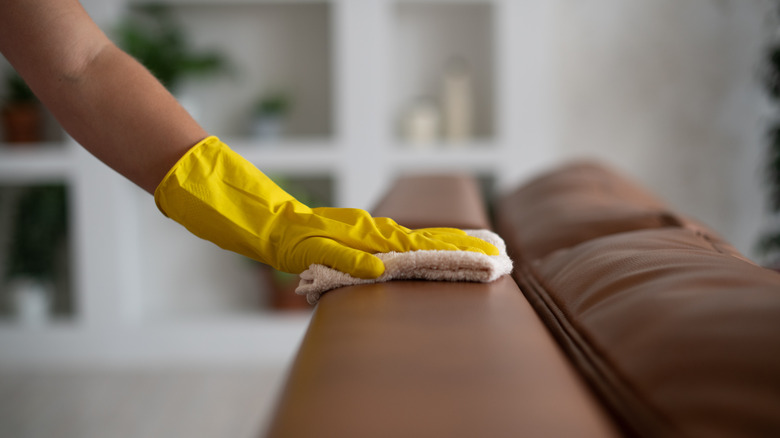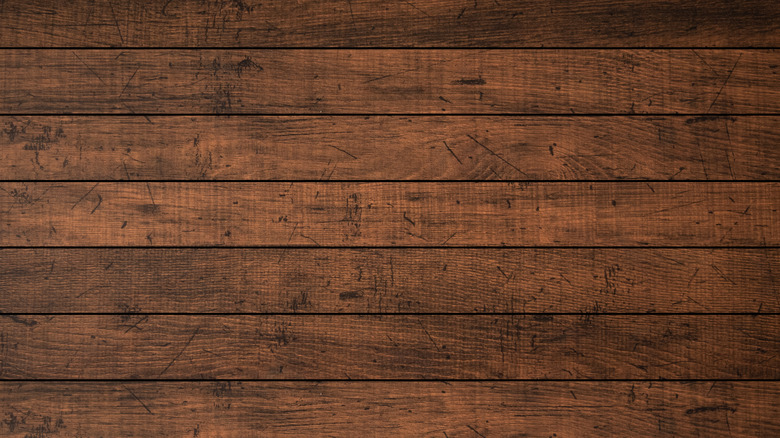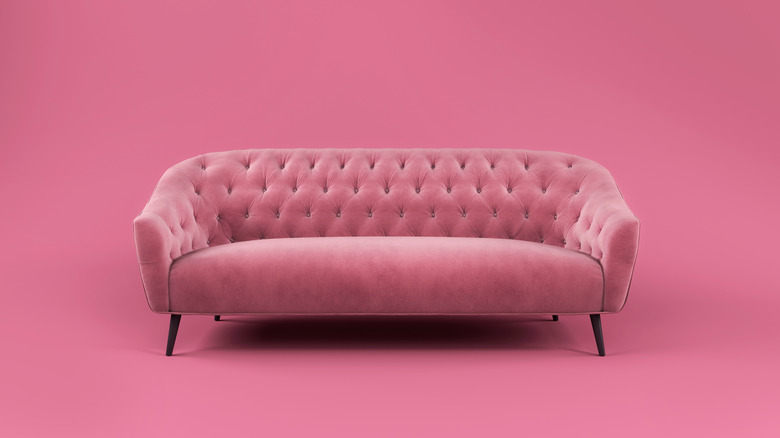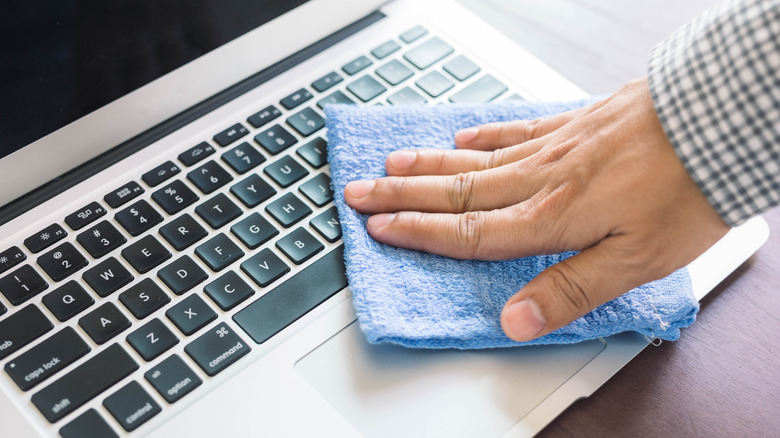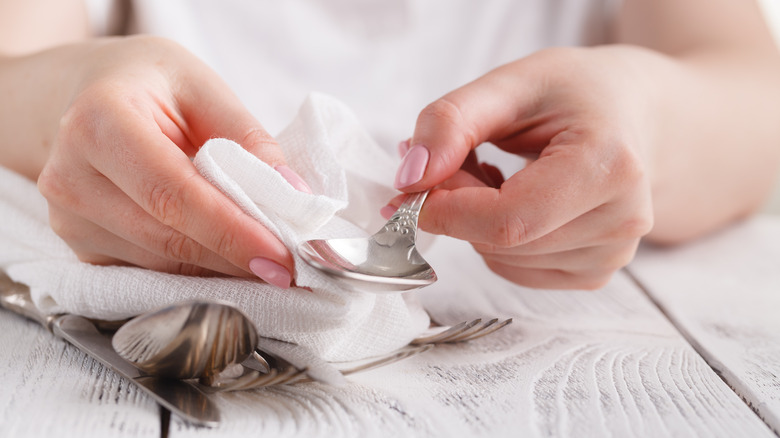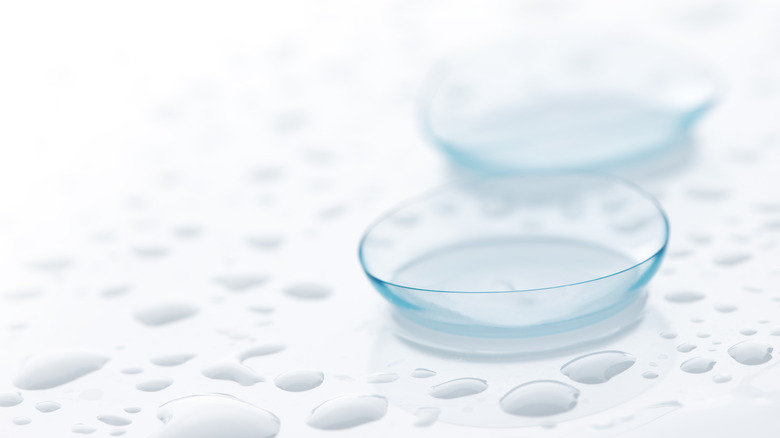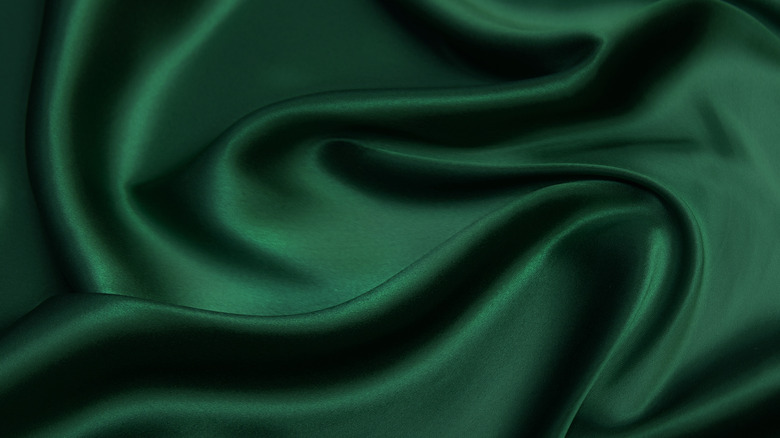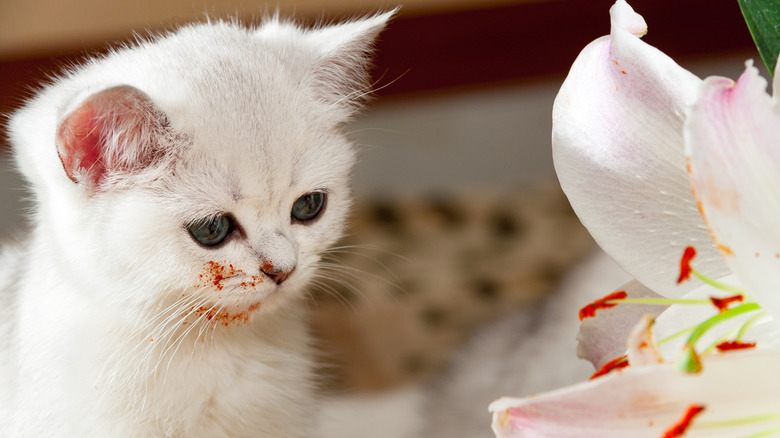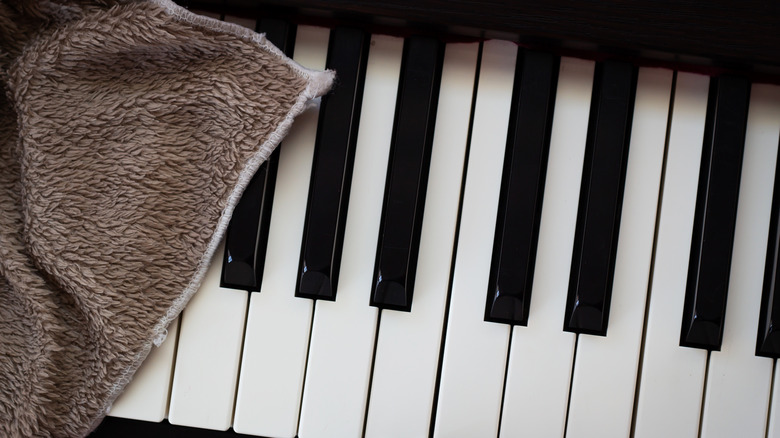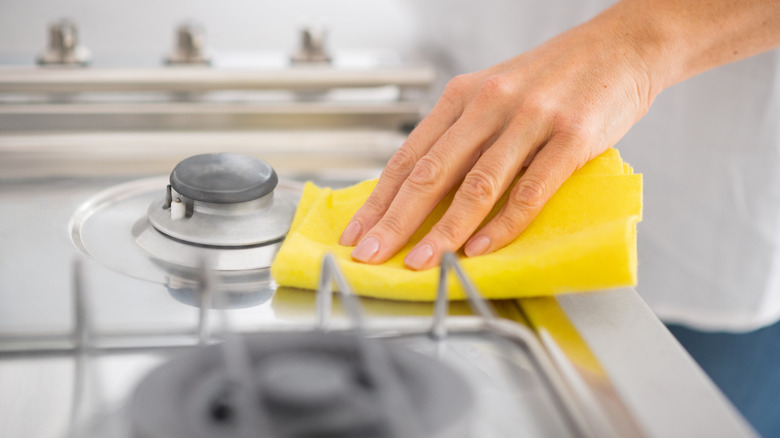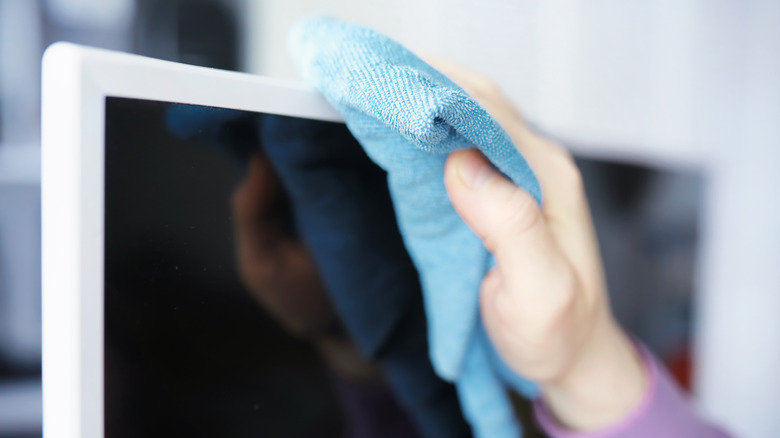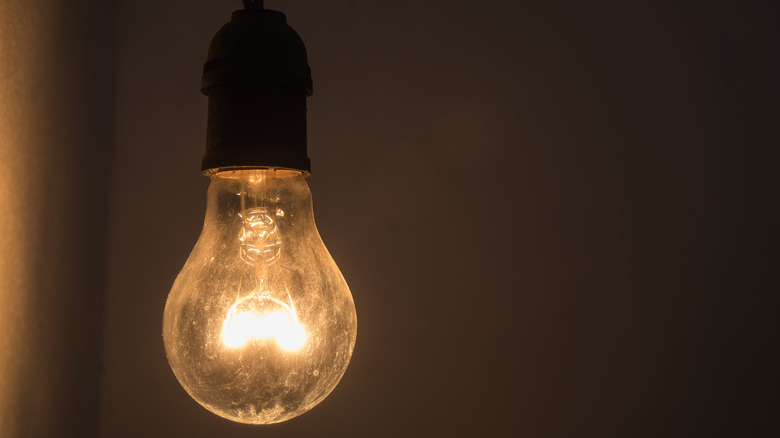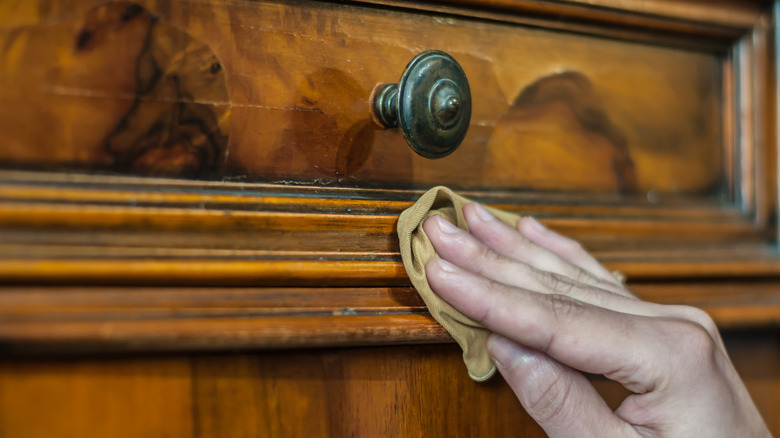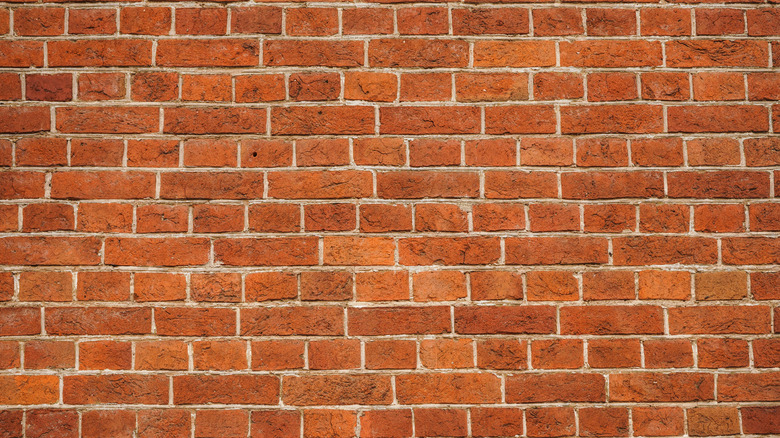Things You Should Never Actually Clean With Water
In recent years, the move away from harsh cleaning products and toward greener alternatives has been enormous. With the increasing demand for environmentally friendly cleaning products — coupled with a wider range of non-toxic options — the green cleaning product market has been projected to be worth $11.6 billion by 2029, almost tripling from its $3.9 billion worth in 2019, per Prophecy Market Insights.
Clearly, more and more people are going natural, which begs the question: Why stop there? Why not just use good old-fashioned water to clean stuff, saving you even more money and hassle in the process? While water or simple water-based solutions can be helpful for a range of cleaning purposes, sometimes, water is a bad choice. There are certain situations when cleaning with water can actually do way more harm than good and when specific cleaning products are a far better option. Keep reading to discover 14 things you should never clean with water.
Leather
Anyone who's had their favorite pair of leather shoes ruined in the rain will know how much water can affect the material. "Leather is delicate, especially when wet, and the color can come off easily," says Carolyn Forte, director of the Good Housekeeping Institute Cleaning Lab, per Good Housekeeping. Not only might your leather lose its color, but water can eradicate the natural oils from the material, leading it to dry out and crack, according to Leather Honey, a leather-care products company.
For smaller, easier-to-clean items, use a mild soap or, as Forte recommends, a specialized leather cleaner. Gently rub it into the spot that needs cleaning with a damp paper towel. Then, wipe it clean, and allow it to air-dry. If you're using soap, treat your leather with a leather conditioner afterward to keep it soft and supple. It's important to do a small spot test before you apply the cleaning product fully to make sure that the application won't remove any color. And, if you have any doubts or if your item is too big or complicated to clean, Forte advises taking it straight to a professional.
Wooden and laminate floors
Although wooden and laminate floors are durable, cleaning them can be more complicated than you think. And, if you're using water, tread carefully. "Water and wood simply don't mix," says Heather Lindemann, senior communications manager for Bona, a floor-care products company (per Realtor.com). "Any amount of water left to sit on a hardwood floor can warp or damage the wood or even degrade the polyurethane finish. A mop and bucket will always leave more water on a hardwood floor than is ideal."
Laminate floors don't fare much better with water. Wetting a laminate floor with a mop and then cleaning it can cause the floor to swell or bubble if water makes its way into the seams, according to Architectural Digest. Your laminate can also end up faded or stained if the water is left on it for too long.
Instead, use an almost completely dry, wrung-out mop to lightly clean your laminate floor once every two months, or try a damp microfiber mop. For wooden floors, Lindemann advises to "look for hardwood floor cleaning solutions that are specifically formulated for the surface, are pH-neutral, and residue-free."
Velvet or suede furniture
Choosing velvet or suede furniture for your home can give it a luxurious feel, but using water to clean such pieces can leave them looking ... not so luxe. The microfibers that make up velvet or suede can be altered undesirably through using water, according to Laura Smith, owner of All Star Cleaning Services (via Reader's Digest). "When the fibers on these fabrics get wet and then dry, they can get stuck in their new position," she says. "This could mean you will have a swipe pattern permanently on our furniture as a result."
With the potential for damage that could occur — as well as the hefty price tag that often comes with velvet or suede furniture — it's smart to hire a professional cleaner, as Smith recommends, who has both the knowledge and equipment to keep your pieces in good shape. "It's best to professionally clean the entire piece to ensure the color remains uniform," says Anne White, Anthropologie's head of home interiors personal styling, according to Architectural Digest. "To ensure your velvet furniture remains in optimal condition, you should have it professionally cleaned with pure, water-free solvents."
Computer keyboards
Between greasy fingers and gathering grime, our computer keyboards can get pretty filthy. And, while a quick wipe with a water-soaked sponge might seem like a nice fast way to clean it up, it's not advised. Your keyboard, after all, is a piece of electronic equipment, and using water could cause serious problems with its operation, according to BobVila.com. Moisture can seep into the openings between keys or, on a laptop, gaps in the computer's outer casing, per Apple, potentially causing irrevocable damage.
It's better to clean your keyboard with an old paintbrush or toothbrush, a soft microfiber cloth, a compressed air duster, or a specially designed computer vacuum. Apple also recommends using a slightly damp, lint-free cloth to remove any dirt. Just make sure you unplug and switch off your keyboard or laptop first to avoid any nasty surprises or shocks. Spraying any moisture directly onto your laptop keyboard is not recommended.
Brass or silver
When it comes to valuable metals like brass or silver, treating them well is a high priority, and cleaning them with water could dim their shine. "Brass fixtures should not be cleaned with water," says Dawna Boone, owner of Valet Maids, according to Realtor.com. "The best way to clean these fixtures is with vinegar. When soaking fixtures such as brass showerheads, never soak them for more than 30 minutes." She also notes that brass doorknobs disinfect themselves within eight hours, so there's not much need to clean them.
Also steer clear of using water to clean silver, advises Angela Chow, operations manager for AspenClean, according to Realtor.com. It can ruin the finish, tarnish the metal, and leave the silver looking streaky. To avoid ruining your fine silverware or jewelry, "it's best to use cleaning products intended for that type of surface," Chow says. "Wipe them dry with a microfiber cloth for a streak-free finish."
Contact lenses
While it might feel like putting anything other than water into your eye is a problem, if you're a contact lens wearer, placing them in just water could leave you with serious consequences. Tap water has an abundance of harmful microorganisms that can cause eye infections and vision loss, says optometrist Christopher J. Quinn, past president of the American Optometric Association, per The Healthy.
Of particular risk is an amoeba called Acanthamoeba, which is frequently found in tap water and well water, states the CDC. It can lead to a condition known as Acanthamoeba keratitis that "can cause an infection of the cornea, the transparent outer covering of the eye (where a contact lens sits), and can cause temporary or permanent vision loss," says Quinn.
As such, the CDC recommends keeping contact lenses away from water at all times by removing them when swimming or showering and by ensuring your hands are clean and dry before handling them. Furthermore, storing your contact lenses in water is not recommended. Instead, use a specially formulated solution to clean and store them.
Silk
A silk shirt can be a thing of beauty — until water shows up. While water can be used to clean certain silk blends, the delicate fabric is prone to damage if it comes into contact with too much moisture, according to Kathy Turley, director of marketing at Home Clean Heroes, per Reader's Digest. "Using water on silk, whether it's your curtains or a shirt, can cause water spots and permanent discoloration," she says. "Better leave it to the professionals, like your neighborhood dry cleaner."
When cleaning clothing, always check the care label for instructions or recommendations from the manufacturer, according to detergent company Tide. If a label states that it's "dry clean only," it's important to heed this and leave it to a professional. However, if a label simply states "dry clean," that's more of a recommendation, and it may be acceptable to hand-wash the garment gently, per Tide. If you elect to do so, wash the item with care, and never leave it to dry in direct sunlight or put it in the dryer because both can damage the fabric.
Pollen stains
If you've ever gotten too close to a bouquet of lilies, you know that pollen stains are notoriously tricky to remove. Unfortunately, water can make them worse. When pollen lands on your clothes or furniture, adding water and trying to wipe it off can dissolve the fine powder and cause it to streak across the fabric, leaving you with a bright stain that's even harder to get rid of, according to cleaner brand Persil. Blotting the stain can have a similar effect because it causes the pollen to work its way further into the material.
To avoid this, for smaller pollen stains, it may be possible to simply shake the particles off the material if it's only attached loosely. Or, if the pollen is a bit more reluctant to move, a small handheld vacuum cleaner can help. If the stain is larger, you can put it through the wash, but be sure to pretreat it first by applying rubbing alcohol or laundry detergent directly to the stain. This will ensure it's been thoroughly dislodged before coming into contact with water.
Pianos
If you want to keep your piano performing its best — and protect your investment in the instrument — be sure to keep the water away. When cleaning your piano keys, in particular, excess water can seep through the gaps and reach the interior of the piano, causing warping, buckling, and general deterioration of your instrument, according to Musician Authority, a music lesson company. Water can also cause the keybed and keys to swell, making your piano unplayable, per piano company Steinway.
A general rule of thumb is to give your washcloth a good wring before using it to clean your piano. If water comes out, it's too wet — you only need a minimal amount of moisture. It's also important to give the areas of your piano that you just cleaned a once-over with a dry towel to make sure no liquid remains on the keys or the body of the instrument.
Gas burners
As one of the places in your home most likely to get greasy and grubby, your gas range needs constant cleaning. But using water to clean the burners can be a fool's errand, says Laura Smith, owner of All Star Cleaning Services, per Reader's Digest. "Don't clean the burners on your gas range with water. The igniters on your gas range are very sensitive to water. If they get wet, they will not turn off when the range is activated, and your range will click over and over again as the igniter keeps going off."
While that clicking may just seem a little annoying — and will generally correct itself once it dries out — too much moisture on your gas range on a regular basis can result in permanent damage and a hefty replacement fee. "Never spray a cleaning product directly into your gas range burners," Smith says. "Spray the cleaning cloth, then wipe down the surface."
Home electronics
While it seems common sense that your TV or video game system may not react well to moisture, it's worth repeating that cleaning them and other home electronics poses a serious risk of damage. "Electronics should only be cleaned with cleaners designed for electronics," says Dawna Boone, owner of Valet Maids, via Realtor.com. "Using water on electronics can permanently damage them and, in the case of electronics with screens, can leave streaks."
In fact, the best way to go about cleaning your home electronics is to avoid using liquid products entirely to avoid any potential damage. Using a microfiber cloth on devices like your smartphone can result in a great clean without the use of any moisture at all. Although, if you need a little extra help, slightly dampening the microfiber cloth can also work, according to Digital Trends. Above all, when cleaning any electrical device, make sure it's switched off and unplugged from any energy source first.
Light fixtures
Your light fixtures can get pretty dusty. And, given the fact that pure electricity is being pumped through them every second that they're turned on, it's little surprise that cleaning lights can often take a back seat. If you're ready to tackle them, though, avoid using water. "This might be a no brainer, but using a wet cloth to clean an outlet cover or light fixtures can lead to risk of electrocution or fire," says Nasutsa Mabwa, president of ServiceMaster Restoration By Simons, per Reader's Digest.
The solution? To clean light fixtures, use a dry cloth or a dry duster, says Mabwa. If you're doing a deeper clean, unscrewing the light bulb and wiping it with a slightly damp cloth can help to remove caked-on dirt, according to cleaning service Merry Maids. As ever, it's important to always exercise caution when working around electrical and light fixtures to prevent injury.
Antiques
Antiques that have been lovingly handed down through the generations need to be tended to carefully. By cleaning them with water, however, you can end up damaging your most cherished items, leaving one-of-a-kind pieces beyond repair. When it comes to antique wooden furniture, using water to clean it can lead to moisture working its way between veneers or into the grain of the wood, causing separation, warping, or buckling, according to Love to Know. Using a small amount of mineral spirits rather than water can provide a good clean for some pieces without damaging the wood, although it's important to do a spot test first.
Other types of antiques can also be ruined by cleaning them with water. Antique porcelain, for example, can be porous, so using too much water to clean it — including submerging it — can cause serious damage (per Household Advice). Usually, using a slightly damp cloth with some detergent can provide all the clean you need.
Brick
Although bricks are usually thought to withstand anything, using water to clean them could leave them worse for wear. It's a porous material, and although brick is usually treated with a protective sealant, water can damage the sealant or remove it entirely, according to Laura Smith, owner of All Star Cleaning Services, via Reader's Digest. When this happens, bricks can become very susceptible to water damage. Using a power washer to clean bricks is even worse: Not only can it dislodge the mortar between bricks, causing structural damage, but it can affect other parts of your home, according to SFGate.
You can avoid this, however, by holding back on the water when it's time to clean your brick surfaces. Instead, use a soft brush to wipe away grime or dirt, and then use a soft cloth to remove anything remaining and finish the job. By doing so, you'll preserve the integrity of your bricks and help them last a lifetime.
